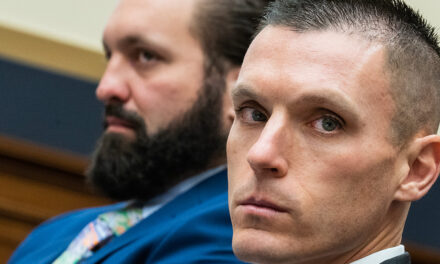We support our Publishers and Content Creators. You can view this story on their website by CLICKING HERE.
In another staggeringly poor choice for the nation, the Biden administration is putting concern for votes in the coming election before national security interests.
Strangely, due to election calculations, President Joe Biden seems to prefer Hamas and China over Israel and Japan.
Already going with the head-shaker of softballing America’s response to Hamas’ terrorist attacks in Israel, apparently because of worries of losing Arab-American votes in Michigan, Biden is now doubling down and doing it again.
This time, the president is reinforcing China’s dominance in steel production rather than working together with ally Japan. The justification is to placate union voters in the key battleground state of Pennsylvania.
Both paths are wrong for American national interests.
In response to Japan-based Nippon Steel’s proposed acquisition of U.S. Steel, Biden issued a “highly unusual” statement March 14 aimed at a pending decision by the interagency Committee on Foreign Investment in the United States. The president placed his thumb on the scale of CFIUS’s review, saying “it is vital for [U.S. Steel] to remain an American steel company that is domestically owned and operated.”
Biden’s statement set off warning signals to those interested in preserving the sanctity of CFIUS’s vital and impartial role in defending America’s national security. The statement was also an avoidable blunder that undermines U.S.-Japan relations.
This was a particularly unfortunate decision ahead of Japanese Prime Minister Fumio Kishida’s state visit this month.
Biden doubled down in a subsequent speech April 17 before the United Steelworkers union, saying that U.S. Steel “should remain totally American.”
He added: “American-owned, American-operated by American union steelworkers—the best in the world—and that’s going to happen, I promise you.”
Why would Biden politicize a deal to the detriment of national security, economic development, and the steel industry itself? It’s because he’s taking “direction” from the United Steelworkers and the union’s corporate ally, steel manufacturer Cleveland-Cliffs Inc.
Nippon Steel outbid Cleveland-Cliffs for U.S. Steel. Cleveland-Cliffs still wants to acquire U.S. Steel, so it has begun calling in political favors to disrupt the deal.
Cleveland-Cliffs has been trying to kill the deal behind the scenes by telling lawmakers that there could be layoffs, even though Nippon has specifically promised to protect standing employment levels.
It gets even more tawdry, as Cleveland-Cliffs CEO Lourenco Goncalves has bragged about his influence over Biden, saying he has “been in total contact with the administration, so I know what’s going on.”
“The contact is about making it abundantly clear between me and [United Steelworkers President] Dave McCall that the only buyer the union accepts for the union-represented assets is Cleveland-Cliffs,” Goncalves added.
The USW’s political influence in electorally vital Pennsylvania empowers it to boss around the leader of the free world, who seems content to be led around by his nose despite the foolishness of this orientation.
Administration officials explained away their decision to the Japanese by pointing to Biden’s “need to retain political support in Pennsylvania,” according to The Washington Post.
Interestingly, even though Biden is being pushed around by Cleveland-Cliffs and the United Steelworkers, the Biden administration had already assessed that an acquisition of U.S. Steel by Cleveland-Cliffs isn’t feasible because of the unique antitrust issues it would present. Perhaps votes also trump legal considerations.
The union absurdly continues to contend that it doesn’t believe Nippon—the world’s fourth-largest steelmaker—has the financial means to support the labor agreement it currently has with U.S. Steel, the world’s 27th-largest steelmaker.
The explanation clearly doesn’t hold water, but it’s apparently enough for the White House. It is obvious that union leaders fear bargaining honestly with the Japanese will be tougher than dealing with a company that works in tandem with the union itself.
Japan is our most important ally in confronting our most challenging threat, the Chinese Communist Party. It’s a sad state of our politics that the president would prioritize union demands over this essential foreign relationship, especially considering the deal would strengthen competition against Chinese steelmaking dominance.
This is a hugely important issue with real national security impact. To cavalierly push it aside to gain a few votes is both dangerous and simply wrong.
Biden seems to be downplaying national security means to achieve his political ends. The Committee on Foreign Investment in the United States should rise above this political election season foolishness and jealously guard its objectivity and legitimacy.
Unfortunately, that has become a much more challenging task thanks to the president’s recklessness and willingness to prioritize real national security measures below partisan political considerations.
There is little doubt that the Biden administration should pull that thumb off the scale and allow the Committee on Foreign Investment in the United States to make the decision based on the facts. The backroom machinations involving disgruntled corporate leaders who lost a bid, a union worried about having to renegotiate contracts with tougher leadership, and political leaders focused on November’s election should not drive this train.
Some things are too important to leave to short-range considerations. True national security interests of a vital nature fall into that category.
Mr. President, do the right thing.

 Conservative
Conservative  Search
Search Trending
Trending Current News
Current News 





